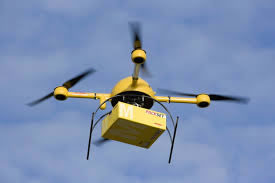Drone vs. truck deliveries: Which creates less carbon pollution?
 University of Washington via Science Daily: Delivering packages with drones can reduce carbon dioxide emissions in certain circumstances as compared to truck deliveries, a new study from University of Washington transportation engineers finds.
University of Washington via Science Daily: Delivering packages with drones can reduce carbon dioxide emissions in certain circumstances as compared to truck deliveries, a new study from University of Washington transportation engineers finds.
In a paper to be published in an upcoming issue of Transportation Research Part D, researchers found that drones tend to have carbon dioxide emissions advantages over trucks when the drones don't have to fly very far to their destinations or when a delivery route has few recipients.
Trucks -- which can offer environmental benefits by carrying everything from clothes to appliances to furniture in a single trip -- become a more climate-friendly alternative when a delivery route has many stops or is farther away from a central warehouse.
For small, light packages -- a bottle of medicine or a kid's bathing suit -- drones compete especially well. But the carbon benefits erode as the weight of a package increases, since these unmanned aerial vehicles have to use additional energy to stay aloft with a heavy load. Full Article:
Featured Product

